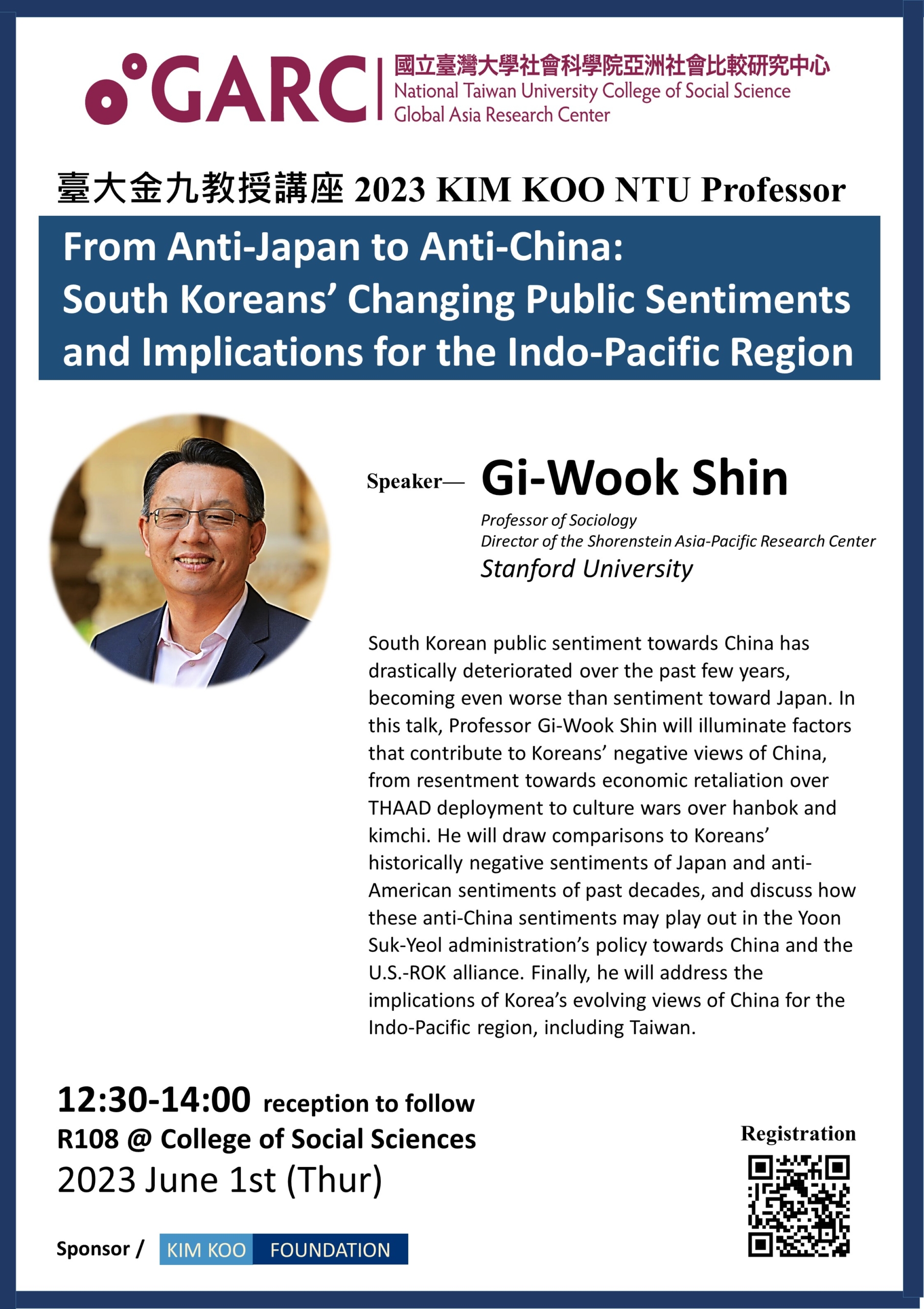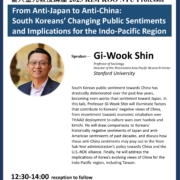【KIM KOO NTU Professor Lecture】 From Anti-Japan to Anti-China: South Koreans’ Changing Public Sentiments and Implications for the Indo-Pacific Region
【KIM KOO NTU Professor Lecture】 From Anti-Japan to Anti-China: South Koreans’ Changing Public Sentiments and Implications for the Indo-Pacific Region
Why is the prevailing resentment in South Korea directed towards China rather than Japan? Does China’s economic retaliation against South Korea’s deployment of missiles contribute to the growing anti-China sentiment among South Koreans? Or is the cultural war over the origin of kimchi also a factor? Perhaps this resentment is a natural reaction to anxiety about China’s rise. Regardless of these questions that may never be answered, what’s more important is how the significant shift in South Korea-China relations will influence the Indo-Pacific region and East Asian countries, including Taiwan.
This year we are honored to have Professor Gi-Wook Shin from Stanford University as our Kim Koo-NTU Professor. He will give a public lecture on Thursday, June 1st at Room 108, Social Sciences College, National Taiwan University. In this public lecture, he will explore the connection and interplay between South Koreans’ collective sentiments towards their neighbors and the geopolitics and international relations within the Indo-Pacific region.
The abstract of this public lecture is as follows:
South Korean public sentiment towards China has drastically deteriorated over the past few years, becoming even worse than sentiment toward Japan. In this talk, Professor Gi-Wook Shin will illuminate factors that contribute to Koreans’ negative views of China, from resentment towards economic retaliation over THAAD deployment to culture wars over hanbok and kimchi. He will draw comparisons to Koreans’ historically negative sentiments of Japan and anti-American sentiments of past decades, and discuss how these anti-China sentiments may play out in the Yoon Suk-Yeol administration’s policy towards China and the U.S.-ROK alliance. Finally, he will address the implications of Korea’s evolving views of China for the Indo-Pacific region, including Taiwan.
This lecture is a hybrid event, primarily held in person, but also allowing remote participation through online streaming. Please register early for this event to ensure you don’t miss out.
Professor Gi-Wook Shin is the William J. Perry Professor of Contemporary Korea in Sociology; senior fellow at the Freeman Spogli Institute for International Studies; the director of the Walter H. Shorenstein Asia-Pacific Research Center since 2005; and the founding director of the Korea Program, all at Stanford University. As a historical-comparative and political sociologist, his research has concentrated on social movements, nationalism, development, democracy, and international relations. He is the author/editor of twenty-five books and numerous articles. You can find more details here:
Gi-Wook SHIN’s BIOGRAPHY (https://aparc.fsi.stanford.edu/people/giwook_shin)
In Summer 2023, Professor Shin will launch the Stanford Next Asia Policy Lab (SNAPL) which is a new initiative committed to addressing emergent social, cultural, economic, and political challenges in Asia. Across four research themes– “Talent Flows and Development,” “Nationalism and Racism,” “U.S.-Asia Relations,” and “Democratic Crisis and Reform”–the lab will bring scholars on Asia to produce interdisciplinary, problem-oriented, policy-relevant, and comparative studies and publications.
Sign up here:
https://forms.gle/L8xQpnC3sL2DAM2d6




